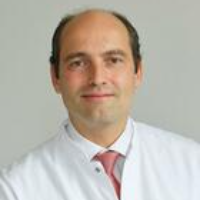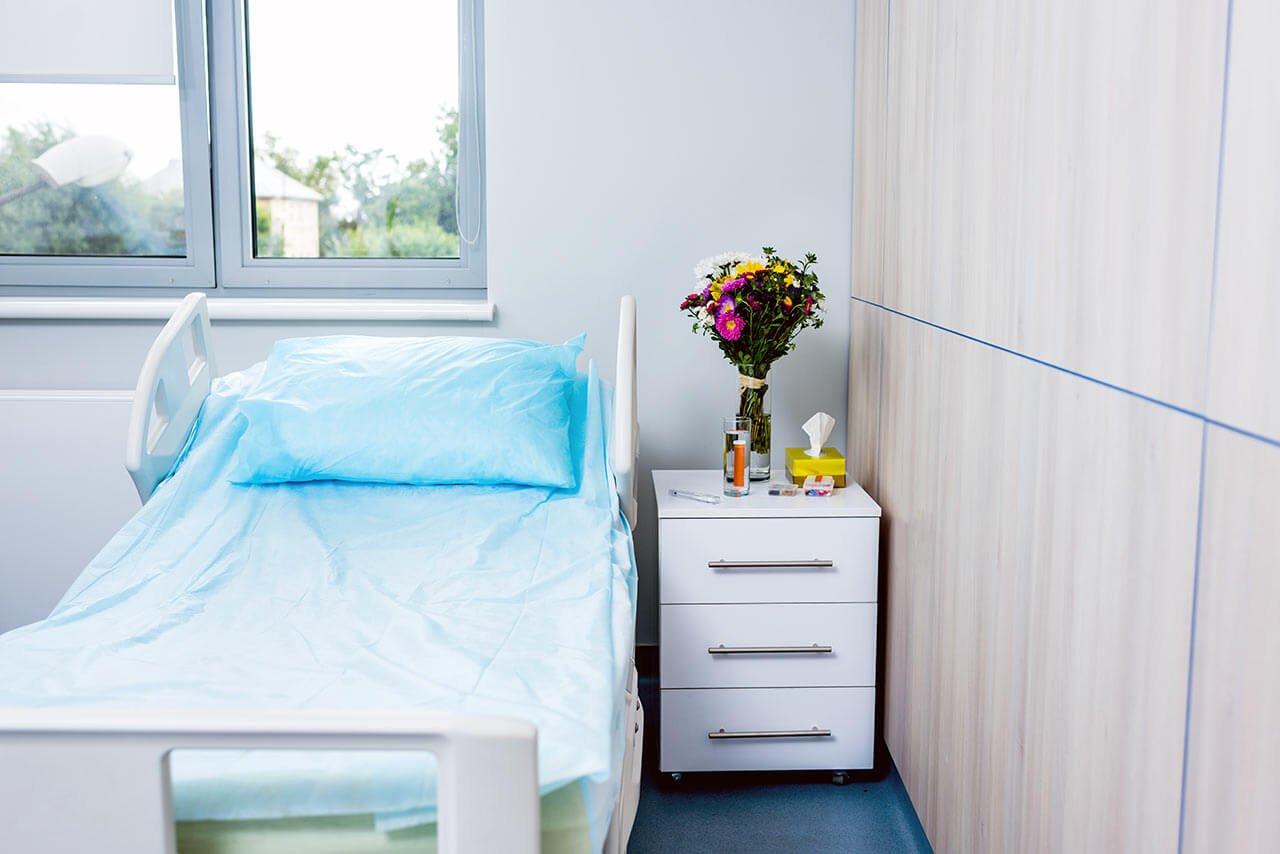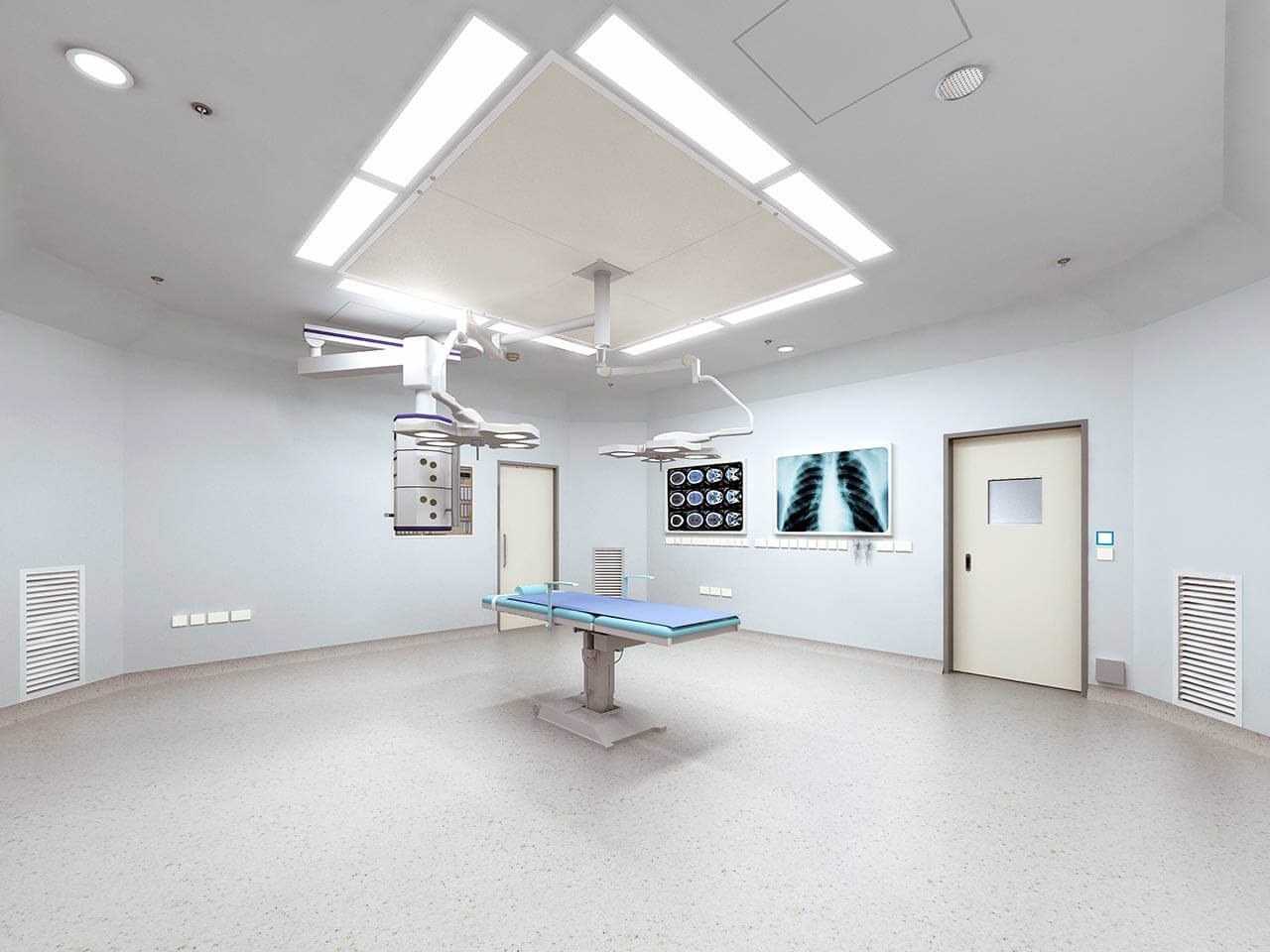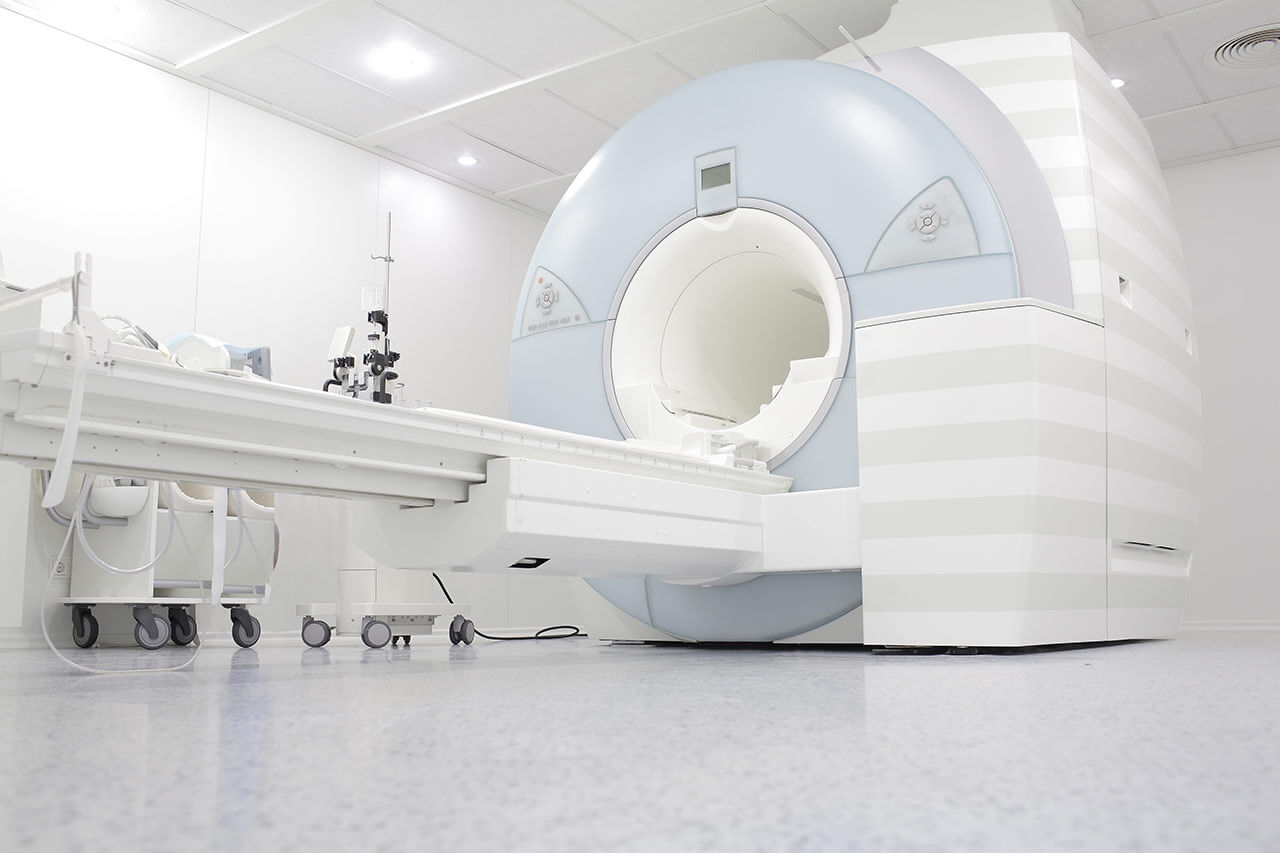
The program includes:
- Initial presentation in the clinic
- clinical history taking
- review of medical records
- physical examination
- laboratory tests:
- complete blood count
- general urine analysis
- biochemical analysis of blood
- inflammation indicators (CRP, ESR)
- indicators blood coagulation
- gynecological examination
- ultrasound examination: pelvis, abdomen
- preoperative care
- resection of abscess Bartholin gland
- symptomatic treatment
- control examinations
- the cost of essential medicines and materials
- nursing services
- full hospital accommodation
- explanation of future recommendations
Required documents
- Medical records
- Ultrasound scan (if available)
Service
You may also book:
 BookingHealth Price from:
BookingHealth Price from:
About the department
The Department of Gynecology, Gynecologic Oncology, Urogynecology, Mammology and Obstetrics at the Hospital Neuperlach Munich offers high-quality diagnostics and treatment of diseases of the female genitalia, breast, as well as pelvic organ prolapse and urinary incontinence. In addition, the department's competence includes the provision of comprehensive obstetric services for the management of pregnancy, childbirth and postpartum care. More than 1,300 babies are born in the department every year. The department is part of a certified Cancer Center, and therefore it has all the necessary resources to effectively treat oncological diseases of the female reproductive system. The treatment of malignancies of the female genital organs and breast is of particular interest to the department's doctors. The work of specialists is based on an individual approach to each patient and on the use of modern sparing therapeutic methods to restore women's health. Cancer patients are offered support of professional psychologists, while gynecologists devote a sufficient amount of time to personal communication with patients, which has a positive impact on the treatment process. The Chief Physician of the department is Prof. Dr. med. Christoph Scholz.
The department's medical team has extensive clinical experience in gynecologic oncology. The medical facility successfully treats uterine, cervical, ovarian, vulvar and vaginal cancers. During the initial consultation, the gynecologist studies the patient's medical history and listens to her complaints, after which he appoints her the necessary set of diagnostic examinations. If cervical cancer is suspected in a woman, she will undergo a Pap test, colposcopy and biopsy, MRI or CT scanning. If ovarian cancer is suspected, the patient has to undergo an ultrasound scanning, tumor marker test and such additional examinations as gastroscopy and colonoscopy, CT and MRI, if required. If the diagnostic results confirm cancer, then the next step in the medical program is the development of an optimal treatment regimen. The treatment tactics are carefully thought out during an interdisciplinary tumor board with the participation of gynecologists, oncologists, radiation therapists, chemotherapists, radiologists and other specialists. All therapeutic measures comply with the current clinical protocols and requirements of the German Cancer Society. In most cases, gynecologic cancer treatment is based on surgical resection of the tumor. The department's specialists always give preference to sparing minimally invasive interventions, while radical surgery on the female reproductive organs are performed only in case of advanced stages of oncology, when complete destruction of a malignant tumor requires the removal of the uterus, ovaries, etc. The surgical resection is often complemented by such conservative treatments as chemotherapy, radiation therapy, antibody therapy, hormone therapy and other therapies. When treating cancer in women of childbearing age, the department's gynecologists select a treatment that will not only cure cancer, but also give a woman the opportunity to feel the joy of motherhood in the future. All patients suffering from cancer receive competent psychological care, since such a diagnosis often causes stress and provokes the development of depressive conditions.
The department's mammologists deal with the diagnostics and treatment of breast cancer, which today is one of the most common types of oncology in women. At the initial consultation, the patient tells the doctor about her complaints, menstrual cycle, etc. Then the doctor palpates the breast and prescribes the necessary diagnostic examinations – mammography and ultrasound scanning. In rare cases, MRI may be required. If the doctors identify suspicious breast growths, the patient will also undergo a punch biopsy. The first-line treatment for breast cancer is surgery to remove the malignant tumor. With the progression of the pathology, a radical mastectomy (total breast removal) may be required. In such cases, plastic surgery for breast reconstruction is additionally performed to restore its aesthetic appearance. However, surgery does not always completely cure cancer. Depending on the individual clinical indications, the operation can be complemented by chemotherapy, radiation therapy, hormonal therapy, antibody therapy and other treatments. Psychological care is also an integral part of the therapeutic process.
The team of the department's obstetricians takes care of the normal course of pregnancy, successful childbirth, as well as postnatal care for the mother and baby. The department has advanced ultrasound equipment for monitoring the course of pregnancy and detecting the slightest changes either in the body of the expectant mother or in the development of the fetus. The department's specialists make every effort to make childbirth as safe as possible. The department offers both natural childbirth and C-section. Whenever possible, obstetricians give preference to natural childbirth. To relieve pain in women during childbirth, the specialists use both classical and alternative methods for pain management, including homeopathy, acupuncture, aromatherapy. The department has three delivery rooms equipped according to the latest medical standards and allow the woman to give birth to a child in any position convenient for her, including in the water.
The department's key clinical focuses include:
- General gynecology
- Diagnostics and treatment of uterine fibroids
- Drug therapy
- Uterine artery embolization
- Vaginal hysterectomy
- Laparoscopic hysterectomy
- Laparoscopically assisted vaginal hysterectomy (LAVH)
- Laparoscopic supracervical hysterectomy (LASH)
- Total laparoscopic hysterectomy (TLH)
- Open hysterectomy
- Diagnostics and treatment of endometriosis
- Hormone therapy
- Minimally invasive surgery for endometriosis treatment
- Partial colon removal in case of progressive endometriosis (in cooperation with specialized doctors)
- Diagnostics and treatment of uterine fibroids
- Gynecologic oncology
- Diagnostics and treatment of uterine cancer
- Laparoscopically assisted vaginal hysterectomy (LAVH)
- Chemotherapy
- Radiation therapy
- Diagnostics and treatment of cervical cancer
- Cervical conization
- Loop excision procedure
- Laparoscopic Wertheim procedure
- Laparoscopic lymphadenectomy
- Total mesometrial resection (TMMR)
- Chemotherapy
- Radiation therapy
- Diagnostics and treatment of ovarian cancer
- Surgical treatment, including minimally invasive one
- Chemotherapy
- Antibody therapy
- Diagnostics and treatment of vulvar and vaginal cancer
- Surgical treatment
- Chemotherapy
- Radiation therapy
- Diagnostics and treatment of uterine cancer
- Urogynecology
- Diagnostics and treatment of pelvic organ prolapse
- Drug therapy
- Workouts to strengthen the pelvic muscles
- Pessary therapy
- Sacrospinal fixation of the vaginal wall or cervix
- Sacrocolpopexy
- Diagnostics and treatment of urinary incontinence
- Drug therapy
- Workouts to strengthen the pelvic muscles
- TVT surgery
- Colposuspension
- Diagnostics and treatment of pelvic organ prolapse
- Mammalogy
- Diagnostics and treatment of breast cancer
- Minimally invasive surgery to remove tumors
- Radical surgery to remove tumors and breast
- Reconstructive plastic surgery to restore the aesthetic appearance of the breasts
- Chemotherapy
- Radiation therapy
- Antibody therapy
- Hormone therapy
- Diagnostics and treatment of breast cancer
- Obstetrics
- Integrated management of pregnancy
- Childbirth (vaginal birth, water birth, C-section)
- Postnatal care for mother and baby
- Other medical services
Curriculum vitae
Higher Education and Professional Career
- 1996 - 2003 Study of Human Medicine at the Ludwig Maximilian University of Munich (Germany), Imperial College London (UK) and Harvard Medical School in Boston (USA).
- 1997 - 2000 Training and obtaining a Bachelor's Degree in Philosophy at the Munich School of Philosophy.
- 1998 - 2003 Cusanuswerk Scholarship for a Research Project.
- 2001 Internship at the Cellular and Molecular Immunology Laboratory, National Institutes of Health, Bethesda (USA).
- 2004 - 2009 Assistant Physician in the Department of Gynecology at the University Hospital of Ludwig Maximilian University of Munich.
- 2009 Board certification in Gynecology and Obstetrics.
- 2009 - 2011 Senior Physician in the Department of Gynecology at the University Hospital of Ludwig Maximilian University of Munich.
- 2011 - 2012 Senior Physician in the Department of Gynecology at the University Hospital Duesseldorf.
- 2012 Master of Health Business Administration (MHBA), University of Erlangen-Nuremberg.
- Since 2012 Senior Physician with management responsibilities in the Department of Gynecology at the University Hospital Of Ulm.
- 2014 Extraordinary Professorship at the Ulm University.
- Since 2019 Chief Physician of the Department of Gynecology, Gynecologic Oncology, Urogynecology, Mammology and Obstetrics at the Hospital Neuperlach Munich, as well as Chief Physician of the department of the same name at the Hospital Harlaching Munich.
Clinical Interests
- Treatment of female genital cancers.
- Treatment of breast diseases.
- Obstetric care for pregnant women with special needs.
- Minimally invasive gynecologic surgery.
Photo of the doctor: (c) München Klinik Neuperlach
About hospital
The Hospital Neuperlach Munich provides modern medical services of the highest quality. The medical center is an Academic Hospital of the Ludwig Maximilian University of Munich, and therefore it can offer its patients innovative diagnostic and therapeutic methods available only in the best German hospitals. The medical complex opened its doors to patients on September 12, 1972 and to this day holds a leading position in the country's medical arena. The medical facility has 500 beds. The highly qualified doctors of the hospital annually admit over 59,000 patients for both diagnostics and treatment, including patients from foreign countries.
The hospital is distinguished by its rich experience and high success rates in conservative and surgical treatment of diseases of the gastrointestinal tract, liver, metabolic disorders, cancers and blood diseases, heart diseases, as well as vascular pathologies. The hospital operates a highly specialized Colon Cancer Center certified by the German Cancer Society. The center is one of the largest medical facilities of this kind in Germany and has advanced therapeutic options for the treatment of life-threatening colon disease. In addition, the hospital provides high-quality obstetric services – more than 1,000 babies are born here annually.
For outstanding achievements in various medical specialties, the hospital was awarded with many prestigious certificates, including the IQM certificate, the DIN EN ISO 9001:2008 certificate, the DGAV certificate as a Competence Center for Liver and Pancreatic Surgery, the DDG certificate of the German Diabetes Society and others. The above mentioned certificates testify to the excellent quality of medical service.
Special attention should be paid to the medical staff of the hospital who have extensive clinical experience and do everything possible to achieve a complete recovery of the patient. During the treatment, both doctors and nursing staff surround the patient with maximum care, support him in every possible way and show a humane attitude. The work of physicians is based on an individual approach to each patient and his clinical case.
Photo: (с) depositphotos
Accommodation in hospital
Patients rooms
The patients of the Hospital Neuperlach Munich live in single, double and triple rooms with all the amenities for a comfortable stay. The patient rooms have a modern and cozy design. Each patient room has an ensuite bathroom with shower and toilet. The furnishings of a standard patient room include an automatically adjustable bed, a bedside table, a wardrobe, a modern multimedia system with a TV and telephone, a table and chairs for receiving visitors. Wi-Fi is also available in the patient rooms.
The patients can also stay in the enhanced comfort patient rooms, which additionally include a safe, a minifridge and upholstered furniture.
The hospital also has a library with a large assortment of books, magazines, CDs and DVDs. In addition, there is a cozy cafe on the territory of the hospital, which offers its guests a variety of delicious snacks, pastries, cakes, ice cream and various drinks. The cafe also has a takeout service.
Meals and Menus
The patient and his accompanying person are offered tasty and healthy three meals a day. All dishes are cooked only from fresh and high quality ingredients. Breakfast and dinner are served buffet style, and the patient can choose the dishes that he likes on his own. For lunch the patient has a choice of three menus, one of which is vegetarian.
If you are on a specific diet for some reason, you will be offered an individual menu. Please inform the medical staff about your dietary preferences prior to the treatment.
Further details
Standard rooms include:
Religion
The religious services are available upon request.
Accompanying person
During the inpatient program, the accompanying person can live with the patient in a patient room or a hotel of his choice. Our managers will help you choose the most suitable option.
Hotel
During the outpatient program, the patient can stay at the hotel of his choice. Our managers will help you choose the most suitable option.





